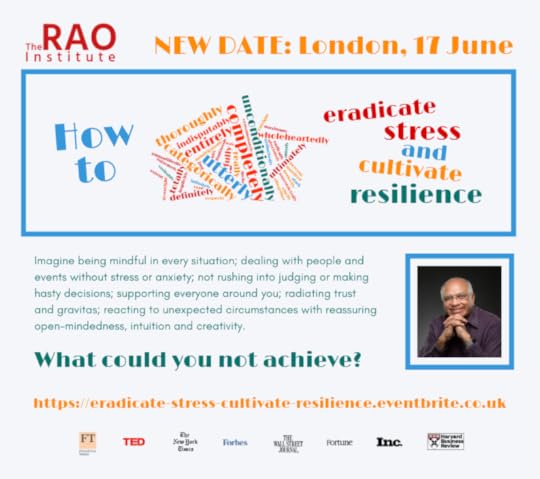Srikumar Rao's Blog, page 28
August 2, 2019
The question you never ask can set you free
The post The question you never ask can set you free appeared first on The Rao Institute.
June 16, 2019
What Spiritual Lesson Can A Baby Teach You?
We have an insidious habit that plays havoc in our lives.
We don’t recognize that we have this habit.
In fact, we may even consider it a virtue.
Curious? Read on …
Many speakers say that we should pay attention to everyone who crosses our path because each person is unique and each person can teach us something if we are only open and receptive.
Perhaps.
Today I would like to you to consider what you can learn from a baby.
And this is a lesson that will instantly improve your life.
Consider Susan:
It was a crowded party and Susan tried her best to avoid Denise, but some interfering busybody grabbed her hand and introduced her to Amanda who, of course, was Denise’s friend and promptly called her over.
Susan and Denise had gone to the same school. They were even friends of a sort.
But then Susan ran for class president and was promptly attacked for being ‘too cozy’ with the administration. It was alleged that she coordinated her campaign with the principal and obtained unfair advantage.
Denise did not back her up. In fact, she campaigned for Susan’s opponent.
They had words. And they never spoke again.
And now Denise was looking inquiringly at Susan. “How are you doing,” she asked.
“Well enough now that I don’t have any traitors in my camp,” she returned tartly.
There was another unpleasant surprise waiting for her the next day.
Susan had just been hired at a new company and it turned out that Denise was her boss.
She wondered if she should quit before she was fired.
She could have cried.
We carry around our hurts and resentments and grievances and feelings of being slighted. This is a rock on our heads and it weighs heavy.
I know a few people who take pride in ‘never forgetting’ that they had been ‘wronged’ by someone and they consider this strength. They also look to ‘get even.’
They are stuck in the past. And, every so often, as happened to Susan, that past will bite you on the nose if you don’t let go of it.
What does all this have to do with babies?
Look at a baby happily gurgling as he drinks from his bottle.
Now take the bottle away.
His face becomes red as he wails mightily and waves his hands and feet in frustration.
Now give him the bottle back.
In seconds he is back to drinking and gurgling happily.
The baby has experienced anger and frustration to its fullest extent and then he lets it go!
The problem with us is that we are pretty good at doing the ‘experiencing’ but lousy at the ‘letting it go’.
Think of the interactions you have with the persons in your life. The ghosts of what happened in the past are always there coloring your views and attitudes and expectations.
You are stuck in the past and you mentally imprison the other person as well by being so.
Try to put your rock down.
Let it go!
Peace!
The post What Spiritual Lesson Can A Baby Teach You? appeared first on The Rao Institute.
June 11, 2019
How To Give up Your Grudges (So You Can Call In More Inner Peace & Joy!)
What do you do if you have a spill on your countertop?
You clean it up.
If you carry a grudge, you essentially have a mess on the figurative countertop of your mind and it is spoiling your beautiful kitchen and your ability to cook healthy meals!
Here’s a simple step you can take to do something about this.

What I am about to share with you has no boundaries. It cuts across cultures, languages, religions and ethnic identities.
When I was teaching at London Business School an average double section would have representatives from twenty or more countries so I know whereof I speak.
Charlotte is a good example.
I was forming groups for an exercise and she gently protested Shelley being with her. “She is thoughtless and rude,” she said. “I don’t think she should be in the class at all.”
I probed deeper.
It turned out that they had gone to the same school and had lost touch for years before they found themselves back together in business school.
Decades earlier, in second or third grade, a group of girls had laughed at a colorful pinafore that Charlotte had worn to school. Shelley was among them.
I probed deeper.
No, they had not interacted since school. They had not spoken in business school.
Charlotte, by now somewhat embarrassed by her response, acknowledged that she was being ‘guided’ by an ancient memory and perhaps needed a course correction.
But we are all Charlotte.
Look at any interaction you have with a person who is an ongoing part of your life. Do you have an expectation of how this will go based on your previous interactions?
More precisely, on the basis of your interpretation of your past interactions?
Look at the grudges you hold. They may be small. You may think them insignificant. But each is a silken thread and many of them can bind you down.
How do you let go of the grudges you hold?
First be aware of them.
When you meet someone with whom you have a troubled history, see clearly that what happened in the past is coloring your expectation of what will happen.
Recognize that it is not what happened in the past but what you think happened in the past that is coloring your expectation.
Then play a game.
Imagine that this is the first time you are meeting this person and be open to whatever happens.
Consciously determine that you will feed the dog.
Be prepared to be pleasantly surprised.
Peace!
The post How To Give up Your Grudges (So You Can Call In More Inner Peace & Joy!) appeared first on The Rao Institute.
June 3, 2019
The Rock You Are Carrying on Your Head (& What To Do About It)
Tiny mental habits niggle at us and wear us down. They sap the energy from us and contribute to the tension and anxiety that is always with us.
Here is what you can do about it.

I went to meet my teacher – guru actually – before I came to the US for doctoral studies.
My mind was troubled – it always was in those days – and I had many questions.
I am sure he addressed them but do not recall what he said.
I do remember gentle admonition he gave me: “Srikumar, the train is powerful enough to carry you and your suitcases. You do not have to keep the suitcases on your head. Put them down.”
It was vaguely comforting but I had no clue about what a profound learning he had just shared with me.
I now do.
Everyday we carry a suitcase on our heads. Every day we carry a burden we should not be carrying. We feel fear and anxiety and nervousness and self-loathing and insecurity.
We think we are not as good as others think and that everyone will soon find this out.
We worry that what we have spent so many years accumulating will be stripped from us.
We fear the global forces that scream at us from news headlines and the impact they will have on society and, eventually us.
These are the suitcases we are carrying.
Seriously, when is the last time you were completely OK? When there was truly nothing bothering you or of concern?
Most of us cannot even remember that time. We are so used to the suitcases we carry.
We try to fix our internal turbulence by external action.
We feel lonely so we rush about trying to find a companion, even ‘the one.’
We fear being fired and jobless so we restrain ourselves at work and try to put ‘our best foot forward’ and ‘not rock the boat.’
How do you put down those darn suitcases?
Just be aware that you are carrying them.
Watch the stories you tell yourself and how quickly they arise and how rapidly force you into emotional domains you do not want to inhabit.
Say you have worked hard on a proposal and submitted it to a client who was ‘in the bag.’
He promised to get back to you by the end of the week but did not. Nor the following week.
And your phone calls were not returned or your emails answered.
Think of how many what-if scenarios you generate. Stuff that you should not have put in the proposal. Stuff that you should have but did not. Deadlines that could have been made more flexible. And so much more.
And the stories don’t end there.
You think of what will happen to your company and you and your plans for the future and how these are upended and more.
Just recognize that they are stories.
Once you have truly seen that these stories have no power except what you give them, you begin reclaiming your life.
Stuff happens.
Watch it happen and enjoy it.
Sometimes you like what happens and sometimes you don’t.
Tell yourself stories that you can enjoy even when things happen that you don’t like.
You go to an expensive restaurant and the service is lousy and the waitress messes up the orders.
You can be royally pissed off. Or you can decide that you will not give any waitress the power to determine how you feel and sit back to enjoy a dish that is strange to you.
Do this will all of the things that bother you each day.
That is how you put down your suitcases.
The post The Rock You Are Carrying on Your Head (& What To Do About It) appeared first on The Rao Institute.
May 26, 2019
How to cope when you’re having a really bad, terrible day
There are times, many times when we feel overwhelmed. When everything that can go wrong, does so.
And when the Universe, in a burst of creative energy, devises ways in which things can go wrong that you could not have dreamed of.
Don’t despair!
You can cope using the technique I am about to share with you.

Hello Folks!
Sometimes we have a terrible day. A day when it seems as if everything that can go wrong does so and the universe seems to have been busy laying banana peels on all of our paths.
Consider poor Paul:
Paul was weary when he came to work. His three-year-old daughter, Alice, had been up all night crying. She had an ear infection and slept for a few minutes and then, energized, bawled for an hour. His wife had an important presentation to make and departed to the guest bedroom leaving him to cope.
He could not leave Alice at the pre-school program she normally went to so he put in a desperate call to his mother who lived an hour away. She agreed to look after Alice but managed to get in some pointed comments about how he was never available to talk any more and how come his wife was not doing a better job with Alice.
The traffic was horrendous and he was late for his staff meeting. Just last week he had made an issue about persons coming late and suggested tartly that a little planning would help them be on time. Being late was discourteous to all he emphasized.
His admin handed him a note as he walked in. An important customer had just canceled a large order. This meant that he was now behind his numbers for the quarter instead of comfortably ahead. And he had just sent out a memo to the analysts stating that sales were well over projection. How would this affect the coming IPO? He wasn’t sure but knew that it would not help.
The phone rang. It was wife. He had forgotten to cancel the appointment with furnace service. A technician had tried the door and somehow set off the alarm and there were cops and firemen at the house. Could he please go there right away and set things straight? And he better do this fast before they stepped on the flowering plants in the new patch around the door.
He wanted to shut the door and howl. Primal Scream seemed a darn good idea.
What do you do when you have a day like this? And we all have such days. Or such moments in otherwise normal days.
First, sit upright with both feet on the ground and your spine straight.
Second, breathe deeply and slowly. Most of the time we use the top third of our thoracic cavities while breathing. Change this. Continue breathing till you feel your stomach expanding gently and feel it collapse as you exhale gently.
Observe your breath going in, going out. Going in, going out. Going in, going out. Do this for two or three minutes.
Your thoughts are running amuck and your mental chatter is out of control. Worry is colliding with frustration as rage tries to get to center stage only to be pushed aside by anxiety and fear. OBSERVE all this happening.
Don’t react from your emotions. PAUSE and continue breathing deeply.
The angry comment that you were about to make. The blistering email that you were ready to send. Ask yourself if they would really serve your longer-term interests.
Then, from the morass of stuff clamoring for your attention, pick the one that is most important. Deal with it calmly. Quite possibly others are being frantic, but you will remain calm and let this rub off on them. This is how YOU develop ‘presence’. Not by appearing unruffled, but by actually being unruffled.
Then pick the next most important item and deal with it, again calmly. Keep going and keep breathing deeply, slowly.
Remember, not matter how ‘bad’ the day is, it will pass and one day you will smile as you tell your grandson about the storms you had to weather.
The PAUSE is a powerful tool and something you can use every day. Even many times every day.
The post How to cope when you’re having a really bad, terrible day appeared first on The Rao Institute.
May 20, 2019
Eradicate Stress and Cultivate Resilience
Imagine being mindful in every situation; dealing with people and events without stress or anxiety; not rushing into judging or making hasty decisions; supporting everyone around you; radiating trust and gravitas; reacting to unexpected circumstances with reassuring open-mindedness, intuition and creativity.
What could you not achieve?
The most important benefit of this one-day workshop is a pervasive one: an increased sense of ease with any situation and a quiet confidence that radiates out and reassures everyone around you. Problems and unexpected events are no longer worrisome. They are merely things that have to be dealt with. They actually become a source of creative inspiration.
You will also experience a marked decrease in stress; enhanced effectiveness; improved relationships across the board; ability to inspire others naturally; comfort with embracing ambiguity; greater resilience and creative responsiveness to uncertainty; enhanced open-mindedness; ability to devise innovative solutions to intractable problems.
Date: Monday, 17 June 2019
Time: 09:00 – 16:30 BST
Location:
Romney Room; RSA (Royal Society of Arts); 8 John Adam Street, London, WC2N 6EZ, United Kingdom
Sign-up here: https://www.eventbrite.co.uk/e/eradic...

The post Eradicate Stress and Cultivate Resilience appeared first on The Rao Institute.
May 19, 2019
What Is True Freedom?
We are obsessed with freedom.
We view it as an inalienable right.
We are ready to fight, and die, for it.
We think we have it and have to protect it because it is fragile and can be stripped from us.
In our minds, freedom is essential for happiness.
Perhaps.
But our thinking about what freedom is and how to get it may be wrong.
Dead wrong.
And this could be costing us dear in terms of happiness.

Hello Friend!
Let’s talk about freedom.
As a country and a society we are obsessed with freedom.
We have codified laws that guarantee us freedom of speech and worship and assembly.
We wrangle endlessly about other “freedoms” such as the right to bear arms.
But we define “freedom” too narrowly.
We equate freedom with the elimination of restrictions on our behavior.
In our relentless pursuit of this goal we are reordering society, smashing traditions and taboos alike.
Sexual preoccupation is reaching new highs as is acceptance of its flaunting.
Illegal drugs are more powerful and chemically complex.
Our popular entertainment constantly stretches and snaps boundaries of taste and propriety.
We have become marvelously adept at titillating our jaded senses.

There is another type of “freedom” that we have not achieved and are not even pursuing.
We are still prey to the ruthless harpies of desire that constantly spur us into action, ignite avarice and overweening ambition and goad us into activities that consume all available time and more.
We are driven by our demons, all of us – takeover titan and LBO artist, corporate chieftain and newly minted MBA, serial killer and confidence trickster, presidential candidate and congressional intern.
The talons of our addictions shred our minds and wreck repose.
Some, like cocaine, we declare illegal and expend vast resources to counteract.
Others, like workaholism, we applaud and reward.
Still others, like hypochondria and gambling, we barely acknowledge.
Like it or not, we are all in the fierce grip of our restless minds, being blown hither and thither like a tumbleweed in a hurricane, expending our psychic energies in emotional roller-coasters that we are helpless to stop and unable to leave.
This, too, is a prison and in our saner moments we want out.
I never saw a man who looked
With such a wistful eye
Upon that little tent of blue
Which prisoners call the sky,
And at every wandering cloud that trailed
Its raveled fleeces by.
Oscar Wilde – The Ballad of Reading Goal
The Story Of A Sage & His Student
We give to others the power to determine our happiness and tranquility and do not even recognize that we have done so.
He was a respected sage, a teacher of many generations of students. No one could match him in knowledge of philosophy and the sacred texts.
He lived simply with his family in the remote countryside.
One of his students, who had achieved great fame and renown in the court of the king, came to visit him. As he paid his respects he noted the threadbare clothes of his teacher and the sparse larder.
“Revered Sir,” he said, overcome with emotion, “Please come with me to the capital. The king will shower you with wealth because there is no one to match you in wisdom. All you have to do is praise His Majesty and you will no longer have to subsist on lentils.”
Tears rolled down the old preceptor’s face. “My son,” said the sage, “Is this all you have learnt in the years you spent with me?
Do you not see that if you would learn to subsist on lentils, you would not have to praise His Majesty?”
The Freedom Of A Rich Inner Life
A student in my Creativity and Personal Mastery program grew up in communist Hungary.
He recalled that, when he was a kid, everyone wore similar clothes and they did not have the consumer cornucopia now available.
“But, somehow,” he recalled, “We were all much happier.”
Krista Tippett, the creator of the On Being podcast, told me of her early days with the American Embassy in divided Germany. Her job took her to both sides of the Berlin Wall.
In the West there was consumer plenty. In the East there was drab sameness and persons could not even paint their houses with the color of their choice.
“But the East Germans had a rich, inner life” recalls Tippet. The West Berliners were impoverished in that regard.
Observations like this were partly responsible for her starting her enormously successful podcast.
This is not a case for moving to an autocratic dictatorship. It is a case for you to look at your life.
How free are you, really, if you cannot sit down for a half-hour without the opiate of TV or your small screen?
So, if you want to find true freedom, start cutting the tethers – and many of them are electronic – that bind you.
And then, like the poet Richard Lovelace you may discover
Stone walls do not a prison make,
Nor iron bars a cage:
Minds innocent and quiet take
That for an hermitage.
If I have freedom in my love,
And in my soul am free,
Angels alone, that soar above,
Enjoy such liberty.
Peace!
The post What Is True Freedom? appeared first on The Rao Institute.
May 12, 2019
How To Rejuvenate Your Life
Do you sometimes feel stuck in a rut? You work the same job, meet the same people, interact the same way with those same people and live a predictable life that has few surprises? Here is how to get zip and sparkle back into your life, and to make the world, or at least your…
The post How To Rejuvenate Your Life appeared first on The Rao Institute.
May 5, 2019
Can a timeless musical teach you to be happy? (Hint: yes, indeed!)
Hello Folks!
I grew up in India and Burma – now Myanmar.
It was a cloistered existence in largely closed societies.
We had no Television. No theater. No clubs. No discos.
Reading was my escape and I devoured books. P G Wodehouse was a favorite and thriller writers like Edgar Wallace and Sapper provided both satisfying chills and a window into the outside world.
One day my English teacher, an Oxonian named Christopher James Stocks, decided to take our entire class to a screening of My Fair Lady.
This was HUGE. My school in West Bengal did not encourage such outings. I have no doubt that he had to engage in all kinds of placating the powers that be to make this happen. He succeeded.
I was enthralled. It was screened in 70 mm and the vibrant colors and stereophonic sound created an experience that still lives.
Covent Garden came alive and I am unable to separate Rex Harrison from Professor Henry Higgins and Audrey Hepburn from Eliza Doolittle.
There are many deep lessons in that musical. I will touch on one of them here.

Life-Changing Wisdom from ‘My Fair Lady’
A timeless musical teaches you to be happy
Eliza has performed splendidly at the Royal Ball and Higgins and Col. Pickering strut around congratulating themselves on the superb job they did in engineering the metamorphosis of a flower girl into a lady.
Eliza leaves and holes up with Higgin’s mother. He misses her and calls on his mother for help and finds her there.
And then there is that unforgettable song, Without You
In particular, I remember the lyrics:
There’ll be Spring every year without you
England still will be here without you
……
And that rain down in Spain
Which stays mostly in the plain
Even THAT will remain without you.
There you have it all. Henry Higgins lived in a world where the world revolved around him.
He viewed all events in terms of their impact on him. How dare Eliza leave him like this? What about his breakfast and bringing him his slippers.
This was the start of his transformation though this was not explored in depth. It was merely hinted at.
You may not be as extreme as Higgins, but are no different in essence.
You, also, look at the world in general and the people in your life, in particular, as accoutrements to your existence.
Does your partner get a great job offer?
You think immediately of how this will affect your relationship.
Try something different.
Try taking yourself out of the picture and focus entirely on being of service to someone.
Create a micro-experience of joy for them. Do this several times each day.
A micro-experience of joy is brief moment when a person feels genuinely happy and at peace.
And there are many ways in which you can create this for persons in your life or who briefly impinge on your life.
You can sincerely tell the man in the line behind you what a wonderful tie he is wearing.
You can tell your daughter that she leaves you wonderstruck at the thought that you, somehow, had a hand in creating her.
Very often a simple, heartfelt compliment will do the trick. But you can, and should, also do stuff. Like give gifts and presents and do your share – or more – of chores and distasteful tasks.
Your imagination is your only limit.
This is one of the exercises in my program Creativity and Personal Mastery.
And many say that the very act of thinking of others and how to make their day, makes their day.
And that is how you can find happiness and fulfillment in your life.
Peace!
The post Can a timeless musical teach you to be happy? (Hint: yes, indeed!) appeared first on The Rao Institute.
April 21, 2019
Yes, it is a wonderful world (& one thing you can do to make it better)
We would all like to live in a wonderful world filled with peace and feelings of brotherhood.
Or sisterhood.
But it seems as if we, collectively, are drifting further and further away from this ideal.
As I write this there are horrific scenes of carnage in Sri Lanka in the midst of what would have been a joyous celebration of Easter.
The hate speech and finger pointing has begun.
So we go back to the question that has bedeviled millions of honest seekers, “How can such unspeakable cruelty be reconciled with a compassionate God/Goddess?”
Scores of persons who have taken my program, Creativity and Personal Mastery, ask how such events can take place in a ‘benevolent universe.’
There is no answer, but perhaps this may make some sense …

Think of your awareness like a flashlight.
It will illuminate whatever you shine it on. If you focus it on the rug on the floor, then that is what you see.
Headlines in the papers, and media generally, are shrill in pointing out the many calamities that are taking place.
There are stories of doom and they contribute to the feelings of gloom that we sink into.
That is what our awareness-flashlight is illuminating.
But there is so much more that we are ignoring as we do this.
A scant century and a half ago it was perfectly normal to have one human being own another.
It was common for errant microbes to decimate entire populations.
The vast majority of all people alive slaved from dawn to dusk simply to keep body and soul together.
Then, as now, there were tyrannical rulers but they had no checks whatsoever on their worst impulses.
All of this is not to deny that there is much ‘wrong’ with the world today and that it needs fixing.
But it is a call to ‘do the fixing’ from a place of quiet optimism rather than despair.
Because the emotional domain you occupy as you move into action has a great effect on how your actions are perceived and the impact they have.
It is not a good idea to pick up a burning coal with your bare hands to hurl them at your enemy.
And, as Gandhi observed, “An eye for an eye makes the whole world blind.”
And will such words – some will say platitudes – make any difference to those personally affected by tragedy.
I do not know.
If you know such a person, reach out and offer support from a place of unifying compassion.
And THAT will make a difference to that person.
Peace.
P.S. Creativity and Personal Mastery begins in London on May 10. The dates of the three modules are May 10-12, June 14-16 and July 26-28.
If you would like to be a part of it, apply here.
The post Yes, it is a wonderful world (& one thing you can do to make it better) appeared first on The Rao Institute.



